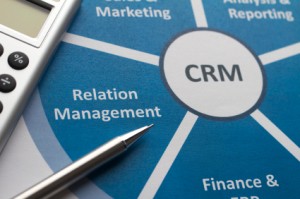Our content is reader supported, which means when you buy from links you click on, we may earn a commission.
What is CRM Software?

CRM, which stands for Customer Relations (or Relationship) Management, is software that helps a business keep track of the prospects it is trying to land and the customers it already has.
A basic CRM definition is a database comprised of prospect and customer names, email addresses, phone numbers, physical addresses and—oftentimes—useful information pertaining to each individual’s preferences, purchase history and more.
 Customer relationship management solutions range from the simple (contact management or automated communication) to the more robust (integrating contact management and automated communication with online storefronts, shopping carts and various tracking capabilities).
Customer relationship management solutions range from the simple (contact management or automated communication) to the more robust (integrating contact management and automated communication with online storefronts, shopping carts and various tracking capabilities).
This technology may be offered on-premise and on-demand, as software installed on your company server, or as software as a service, which is usually web or cloud based.
A good business CRM solution will make it easy to run your company more efficiently while increasing prospect conversions, improving customer satisfaction, targeting marketing efforts and maximizing sales revenue. You’ll get more business by managing the customer relationships you have and targeting your communications with prospects, all while reducing your overall operating costs.
Autoresponders – Email Only CRMs
Email autoresponders are essential components of any business CRM solution. They make it possible for a company to automate email communications with both customers and prospects. Automation generally results in lower operation cost—a plus for any small business.
According to a study conducted by JupiterResearch, nearly one-third of all companies take more than three days to respond to a prospect or customer’s email inquiry.
Some never respond at all.
Slow response and lack of response both result in business lost—contributing to the poor sales problem, which is many small business owners’ biggest complaint.
In a way, it’s understandable. Responding to every email that comes in to your office can take hours—hours that you, or your staff, could be spending on other essential business functions, like marketing, which is also necessary to improve sales. Fortunately, an autoresponder service can tackle all of these challenges.
Autoresponders serve two basic functions. The first is to return a pre-programmed response to any email sent to a particular mailbox. For example, let’s say you have an email address, info@yourbusiness.com, where prospects contact you for additional details on your product or service. You receive dozens of emails each day requesting your information packet. You can spend hours responding personally to let them know an info packet is on the way, or you can mail the packet without a response. The first option costs you valuable time. The second option makes your company seem impersonal.
If you’re using an autoresponder service, you can program it to send a response to each prospect that sends an email to the info@yourbusiness.com address indicating that you have received their request, the packet is on its way, and they should contact Tim Smiley in sales at 555-123-1234 if they have further questions. Good email autoresponders will allow you to program each message in such a way that it will populate with the prospect’s name in the appropriate places—making it look like the response was generated by a real, live human being—even though it wasn’t.
Add opt-in fields to your email web forms and you can then add prospects to your mailing list. Now you can utilize the CRM solution to communicate with current customers and prospects about special offers and promotions as well as additional products they may be interested in. You may use email marketing autoresponders to send marketing emails, newsletters, service updates, personalized thank you notes, requests for feedback, requests for referrals and more.
For example, let’s say you have a field on your web form that allows clients to “opt-in to receive special offers, advanced notice of promotions and other valuable communications from yourbusiness.com.” The autoresponder service collects the details of everyone who opts in. Some of these CRM solutions will allow you to segment your list, so you can theoretically separate the database created into prospects (those who have yet to buy) and customers (those who have purchased from you). Now you can use the email marketing autoresponder to send a series of personalized, targeted informational emails to the prospects list and another series of personalized product upsell emails to your customers.
It’s important to note that autoresponder deliverability is an issue for some small businesses. The CAN-SPAM law requires that companies format their business-related email communications according to the law’s guidelines. Companies that fail to do so may find themselves facing fines, blacklisted or wasting resources on emails that go straight into the SPAM folders of their prospects and clients. For this reason, it’s often best to avoid using free autoresponder services and to look for a product that includes a SPAM rating and compliance feature.
Additionally, you should look for an autoresponder with tracking and reporting features. This will enable you to tell how many recipients opened their emails, what links they clicked, how many unsubscribed, and possibly even calculate your sales revenue per message. Your ultimate goal is to save time, reduce operating costs and improve sales. Tracking this data will help you ensure that your efforts are paying off.
Email only CRM suggestion:
Aweber (*affiliate link) is an email only customer follow-up solution. It’s an autoresponder that allows you to send out automated messages as well as broadcasts.
Fully Integrated Ecommerce Solutions
Some small businesses will benefit from customer relationship management solutions that integrate with ecommerce, tracking everything from the initial contact, to sales, to follow up as well as automating communications and managing prospect and customer contact information.
A more robust business CRM solution is especially useful to companies selling products and services on the Internet. When you integrate ecommerce compatible CRM software with the shopping cart and back end of your online storefront, you are able to gather a more complete picture of your customers. This allows you effectively track patterns, identify opportunities and generate more revenue. With an automated system, you’ll also reduce your transaction processing costs.
For example, let’s say your company sells t-shirts and you do not have an ecommerce integrated CRM solution. Yesterday, 100 customers placed 100 orders. You export the orders into an excel spreadsheet and send it to your fulfillment department. The fulfillment department begins processing the orders. You then receive an email informing you that the company is out of stock on some of the designs ordered. You contact the clients. After that, you check your email and discover that ten of the clients from the previous day want to change their orders. You look at your spreadsheet to determine the order numbers. You then contact the fulfillment department. It’s too late to accommodate the client requests because fulfillment has finished packing their orders.
If you had an appropriate business CRM solution in place, the situation would be different. Because it integrated your inventory tracking system with the online storefront, clients cannot order out of stock products. Because your fulfillment department has access to their portion of the sales funnel through the CRM software, you don’t have to spend time downloading orders into a spreadsheet. Because the system allows customers to manage their submitted orders, changes are instantaneous up to the point of fulfillment without your staff getting involved. And, because the software tracks everything from start to finish, you’re able to pull a report at the end of each week to see how much time the average prospect spent on your website, the quantities of products ordered, revenue generated per visit, and other details to help you improve your business.
Ecommerce CRM Recommendation:
Infusionsoft (*affiliate link) is an ecommerce solution including an affiliate management system + a ‘smart autoresponder’. It allows for far more segmentation and customization of automated follow-up than virtually any other autoresponder. You can also get a trimmed down version with just the ‘smart autoresponder if you’re not offering products or services.
Why Every Small Business Owner Needs to Use CRM
Building Relationships
 Business is all about relationships. Even though consumers are increasingly using the Internet to locate the companies with which they want to do business, and to buy products and services, they still value interaction with a real human being. They also want to purchase from someone who they feel actually knows them. Customer relationship management solutions make it possible to build stronger relationships with your current client base.
Business is all about relationships. Even though consumers are increasingly using the Internet to locate the companies with which they want to do business, and to buy products and services, they still value interaction with a real human being. They also want to purchase from someone who they feel actually knows them. Customer relationship management solutions make it possible to build stronger relationships with your current client base.
Think about your best friend. She knows your birthday. She knows your anniversary. She knows whether your prefer Coke or Pepsi. She knows if you respond better to texts, emails or phone calls. She knows just about everything there is to know about you.
A business CRM solution can make you this knowledgeable about your clients. Use it to track personal preferences, past purchases, birthdays and anniversaries. Then draw upon this data to prove you know your customer with every communication. This will make them feel special—and customers who feel special are more likely to continue using your service or buying your products. You’ve turned a one-time sale into a client for life.
Increasing Profits
 It’s time to talk about sales again.
It’s time to talk about sales again.
If your small business is struggling with poor sales, and many are according to that National Federation of Independent Business survey, then a business CRM solution will help you better manage your customers to increase your profits. Think about it—the better you understand your customers, including their purchase histories, the more targeted you can be in your sales approach, your email marketing, and your other communications. The more targeted you are, the higher your revenue per customer.
For example, let’s say you sell books. A customer purchases the first book in a series of three. Your CRM software sends an email a week after the purchase to recommend the customer buy the second book in the series. He does—and you’ve just generated twice the revenue from that customer. Or perhaps you run a restaurant. You use your CRM software to track data like the anniversaries of your patrons. Your CRM system sends an automated email to each of them during their anniversary month, offering a free appetizer with purchase of two entrees. Eighty percent of these patrons redeem the offer. You’ve just spurred repeat visits from each of these customers.
Converting Leads
 Oftentimes, converting a prospect to a customer is the hardest thing to do. Those in marketing circles have said you may have to get your name/product/message in front of a prospect seven to ten times before they are ready to buy. If you do it manually, the process takes time—and costs a good deal of money, whether you’re touching the prospect by email, direct mail or a telephone call. A business CRM solution automates conversions—increasing efficiency while minimizing costs.
Oftentimes, converting a prospect to a customer is the hardest thing to do. Those in marketing circles have said you may have to get your name/product/message in front of a prospect seven to ten times before they are ready to buy. If you do it manually, the process takes time—and costs a good deal of money, whether you’re touching the prospect by email, direct mail or a telephone call. A business CRM solution automates conversions—increasing efficiency while minimizing costs.
For example, if you send out a free report in exchange for your visitor’s email address, everyone who filled out the web form requesting more information is now a prospect. It could take seven to ten communications for anyone to purchase. Because you’ve set up an autoresponder email series with your CRM software, these prospects will receive an informational email every week until they buy or opt out from further communication—and you don’t need to lift a finger.
SmallBizCRM states that benchmark studies show the following benefits of implementing customer relationship management solutions in small businesses:
- Revenue – Increase of up to 41 percent
- Lead Conversion Rate Improvements – More than 300 percent
- Customer Retention Improvements – 27 percent
- Sales and Marketing Cost Decrease – 23 percent
- Profit Margin Improvements – 2 percent
I’m not entirely sure where they collected this data, but even smaller numbers than these could make a big difference in the bottom line of any small business.
How CRM Software Increases Your Sales
 CRM software can help you increase sales in three ways: nurturing relationships to retain more clients, delivering superior customer service, and understanding your ideal prospect.
CRM software can help you increase sales in three ways: nurturing relationships to retain more clients, delivering superior customer service, and understanding your ideal prospect.
Client Retention
According to the American Management Association, loyal customers account for 65 percent of sales at most businesses. A business CRM solution will help you build stronger relationships with your customers—turning more of them into loyal, repeat buyers.
If you don’t nurture those relationships, your clients may move on to a competitor—which costs you sales. However, Bain and Company, a global management-consulting firm, found that increasing customer retention by just five percent could increase businesses’ profits by 25 to 95 percent.
Superior Service
Customers don’t buy based on product and price alone. Your small business is likely one in a hundred (or more) of others doing the same thing for essentially the same price. Superior customer service yields an advantage—and the automation and collection of data made possible by a CRM solution will enable you to deliver that level of service.
Ideal Prospect
Your ideal prospect is someone essentially identical to the customers you already have. When you use CRM to get to know your customers and their demographics, you can use that information to buy mailing lists to enhance your marketing efforts.
According to IDC Global Market Intelligence Firm, the ROI of a successfully implemented CRM solution will yield a return from 16 percent to more than 1000 percent. More than half of the companies they surveyed had ROI of between 50 percent and 500 percent.
Who Needs a Business CRM Solution?
The answer is everyone. If you’re in business or running a business that relies on customers, you will benefit from a customer relationship management solution. This includes beauty salon owners, dog groomers, accountants, real estate agents, mortgage brokers, veterinarians, personal stylists, retail shopkeepers, bed and breakfast owners, affiliate marketers, Google AdSense users, bloggers, business consultants and more.
Ask yourself these questions:
- Do I sell a product or service?
- Do I communicate with customers?
- Do my customers have different demographics?
- Do I want to target my marketing efforts?
- Do I want to target my prospecting efforts?
- Do I want to save time and money with automation?
- Do I want to track trends to increase revenue?
- Do I want to know where every order is in the pipeline?
- Do I want to know where every prospect is in the conversion process?
- Do I want everyone in my business to know the customer like his/her best friend?
If you answered “yes” to any of these questions, you need a CRM solution.
For example, let’s say you’re an affiliate marketer. A company rewards you for each customer who makes a purchase on their site. As when selling a product on your own, it may take several attempts to get the prospect to transition into making a purchase. A business CRM solution will help you track prospects, communicate with prospects and customers, and upsell the products of other businesses you are affiliated with as well.
How to Choose CRM Software
Customer relationship management software comes in all shapes and sizes, from those offering basic communication features (autoresponders) to those that integrate with ecommerce to track client data, coordinate marketing, facilitate sales and function in unison with your shopping cart and online storefront. One single software package will not work for every business.
You know you need a business CRM solution. But how to do you choose from the literally hundreds of options available? The simple answer is to determine your overall goals, and then select a product with the features required to meet them.
For example, perhaps you want to reduce operating costs by automating your client communications. A simple autoresponder may fit the bill. But maybe you also want to measure the ROI of various marketing campaigns? In that case, you’ll need CRM software that has autoresponder and email marketing capabilities as well as features to track the results of each sales attempt.
Common CRM software features include:
- Multi-user licenses
- Automated data backup
- Data encryption
- Automated email communications
- Reporting functions
- Database customization
- Document sharing
- Task tracking
- Schedule and calendar
- Import functions
- Customer support
- Integration with an online storefront
- Integration with an inventory management system
- Integration with a shopping cart
What do I Need to Know Before Buying CRM?
There are many things to consider when shopping for CRM software solutions. As we’ve discussed, a good place to begin is with your overall goals, which will determine the features your CRM software must have. You can then narrow the list of possibilities accordingly.
You’ll also want to determine which type of CRM you’ll be most comfortable with.
- Do you want a program that resides on your company server?
- Or do you prefer software as a service, or a cloud-hosted option?
If you elect to use an on-site program, you’ll need to maintain server security and back up your data regularly. The program should have encrypted data capabilities and an auto backup feature. While on-premise CRM systems give you greater control, usually in the form of more customization and integration, they also require more IT assistance to set up and maintain.
Complexity and compatibility are also essential considerations.
- Is it easy to configure the software or launch the Internet-based solution?
- Can you integrate data from other sources (like Outlook or Excel)?
- Is the CRM software solution customizable so you can modify it to fit your company’s processes?
- Is the program compatible with the operating system your business is already using?
The system you choose must also be able to handle enough clients and prospects to meet your business needs. For example, if you have a database of 1000 past clients, you wouldn’t want to buy a business CRM solution that maxes out at 500. Additionally, if you have ten employees who will need access to the system, you don’t want to buy a program that only offers five user licenses.
The next thing to consider is ease of use. The key to success with any CRM software implementation is consistency. If the program is difficult to use, you’ll have to spend valuable hours on training. The more cumbersome it is, the less likely you—and your staff (if you have any)—will be to use it. If you’re not using it consistently it’s basically a waste of money.
Finally, look at price. While it’s always important to stick to your small business budget, you should not base your CRM software purchase decision on cost alone. Hosted systems (those that are Web-based or in the cloud), tend to require less upfront cash to implement. They’re also easier to get up and running, resulting in less implementation time. However, the long-term costs may be greater than an on-premise solution because most require a monthly fee per user.
Sometimes a test drive is the only way to tell if a CRM software solution will truly work for your business. The vendor you’re considering should be willing to offer you a free trial period or other such evaluation method to make this possible. If not, I’d suggest moving onto your second choice.